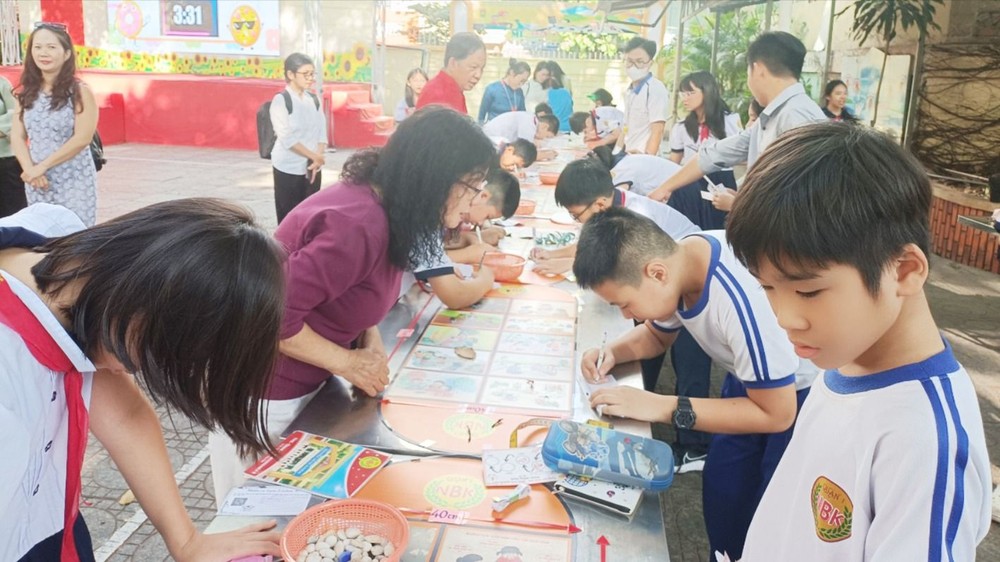Although there are documents issued by the management authorities regarding regulations and instruction on schools’ financial activities in every academic year, many schools in HCMC still struggle to allocate revenue sources and implement fundraising projects, leading to suspicion and even negative reactions from parents.

Several ways to mobilize revenue sources
In the academic year of 2023-2024, some schools such as Thoi Thanh Primary School and Dang Thuc Vinh Secondary School in Hoc Mon District have decided not to collect operation fees from the school’s Parent Representatives Committee and also do not implement any fundraising plans. When funds are needed for activities, the parent representatives voluntarily contribute their own money to support the school. For instance, in a recent cultural event held in Dang Thuc Vinh Secondary School, parents happened to notice a lack of equipment while passing by the stage, so they suggested providing support.
According to the Principal of Dang Thuc Vinh Secondary School, Mr. Tran Cong Nghia, the school has been following this approach for many years as they hesitates to actively seek funding due to past instances in which parents complained about contributions. They questioned why some students paid while others did not, despite studying in the same class and participating in the same activities.
On the other hand, some schools choose a different way. At the beginning of school year 2023-2024, Vo Truong Toan Secondary School in district 1 implemented a fundraising plan of VND268 million (US$10,809) approved by the Division of Education and Training of District 1. According to the school’s Principal, Ms. Nguyen Thi My Hanh, until the middle of the second semester, they have mobilized VND199 million (US$8,030). The contribution list includes 1,415 out of 1,428 parents participating, with the highest contribution being VND1 million (US$40.35) and the lowest being VND50,000 (US$2.02).
Mr. Cao Thanh Binh, Head of the Culture and Society Committee (HCMC People's Council), said: "The participation rate in the entire the schools was almost absolute. All these contributions are based on voluntary spirit, but it will create pressure on parents if implemented extensively, which is not in line with the actual purpose and significance of mobilization."
Vo Truong Toan High School in district 12 also imposed a fundraising plan of VND400 million (US$16,140), approved by the Department of Education and Training of HCMC, to mobilize funding for two categories: repairing and replacing TVs and equipping sunshades for classrooms. However, by the end of the first semester, the school has mobilized VND140 million (US$5,649), with a participation rate of less than 50 percent of the student number. Therefore, they will equip sunshades for classrooms first because of the scorching hot weather in HCMC these days. Regarding the purchase of TVs, since there are not enough funds, they will continue to mobilize and implement this in the second semester.
Not daring to mobilize because of fear
Ms. Nguyen Thi Viet Tu, Deputy Head of the University Education Department, International University (National University of Ho Chi Minh City), expressed: "In the context of limited budgets, education requires the collective effort of parents. To prevent financial activities in schools from being corrupted and to maximize their effectiveness, regulatory agencies have issued many guidelines, but each place implements them differently."
Mr. Cao Thanh Binh, Head of the Culture - Society Committee under Ho Chi Minh City People's Council, explained that every school needs a common fund for its activities, and the key is how schools manage and operate it to gain parents’ trust and agreement.
Circular 16 issued by the Ministry of Education and Training on August 3, 2018 regulating sponsorship for educational institutions under the national education system is a legal basis for schools to implement sponsorship campaigns during the academic year. Sponsorship must adhere to the principles of voluntariness and transparency, without setting average or minimum sponsorship amounts or treating sponsorship as a condition for providing educational services.
However, some schools opt to use funds from the operating budget of the class’s Parent Representatives Committee instead of launching an official sponsorship campaign. This is against the regulations of the Ministry of Education and Training, as the operating fees within classes cannot be used to purchase equipment for classrooms, Mr. Cao Thanh Binh added.
From a management perspective, according to Mr. Tran Khac Huy, Head of the Financial Planning Division under Ho Chi Minh City Department of Education and Training, contributions from parents are such valuable resources that should not be overlooked. Current regulations do not prohibit schools from receiving financial support from parents, but there needs to be a clear plan that is implemented with transparency and approval of the authorities.
In addition, representatives from the Department of Education and Training emphasized that when implementing sponsorship campaigns, schools should not compete for revenue achievements between classes and should not create pressure on parents and homeroom teachers. Sharing about the purpose and significance of the fundraising projects to parents is key for schools to gain support from them. Moreover, schools should also avoid engaging in improper practices due to concerns about public opinion on this.
Drafting a receipt or property transfer agreement
To cut down revenue sources, many schools in HCMC equip classrooms with air conditioners through the form of parents “lending" or donating them. After 3-5 school years (depending on the grade level), the school will ask for opinion of the Parent Representatives Committee of the class on whether parents want to reclaim those facilities or donate them to the school so that they can be used in the next school years.
A representative from the city’s Department of Education and Training stated that schools are public non-business units. When installing, equipping, or receiving valuable assets, the school must have a receipt or property transfer document according to the regulations, and there should not be any situation where items are installed or removed without proper management.
























